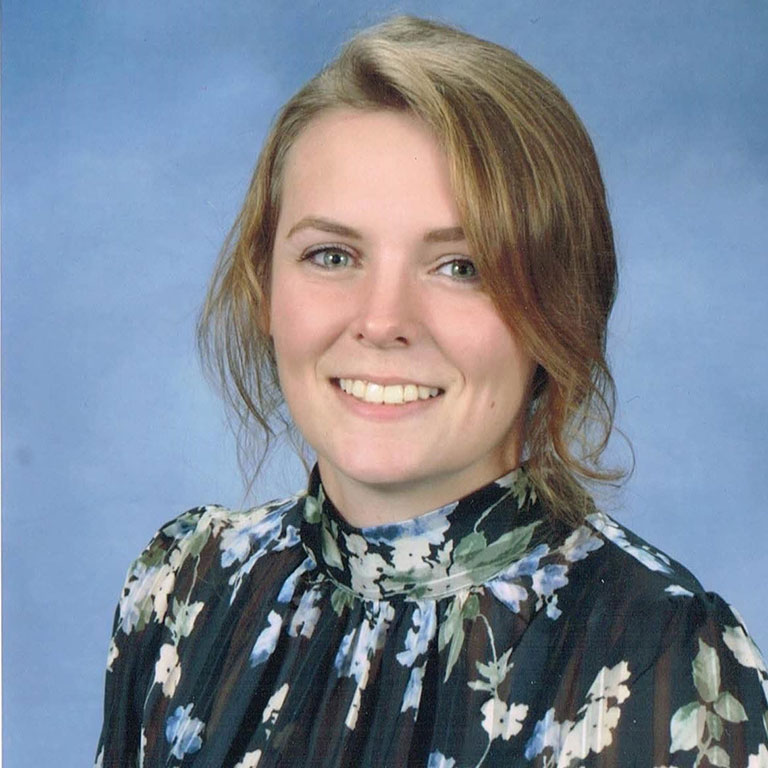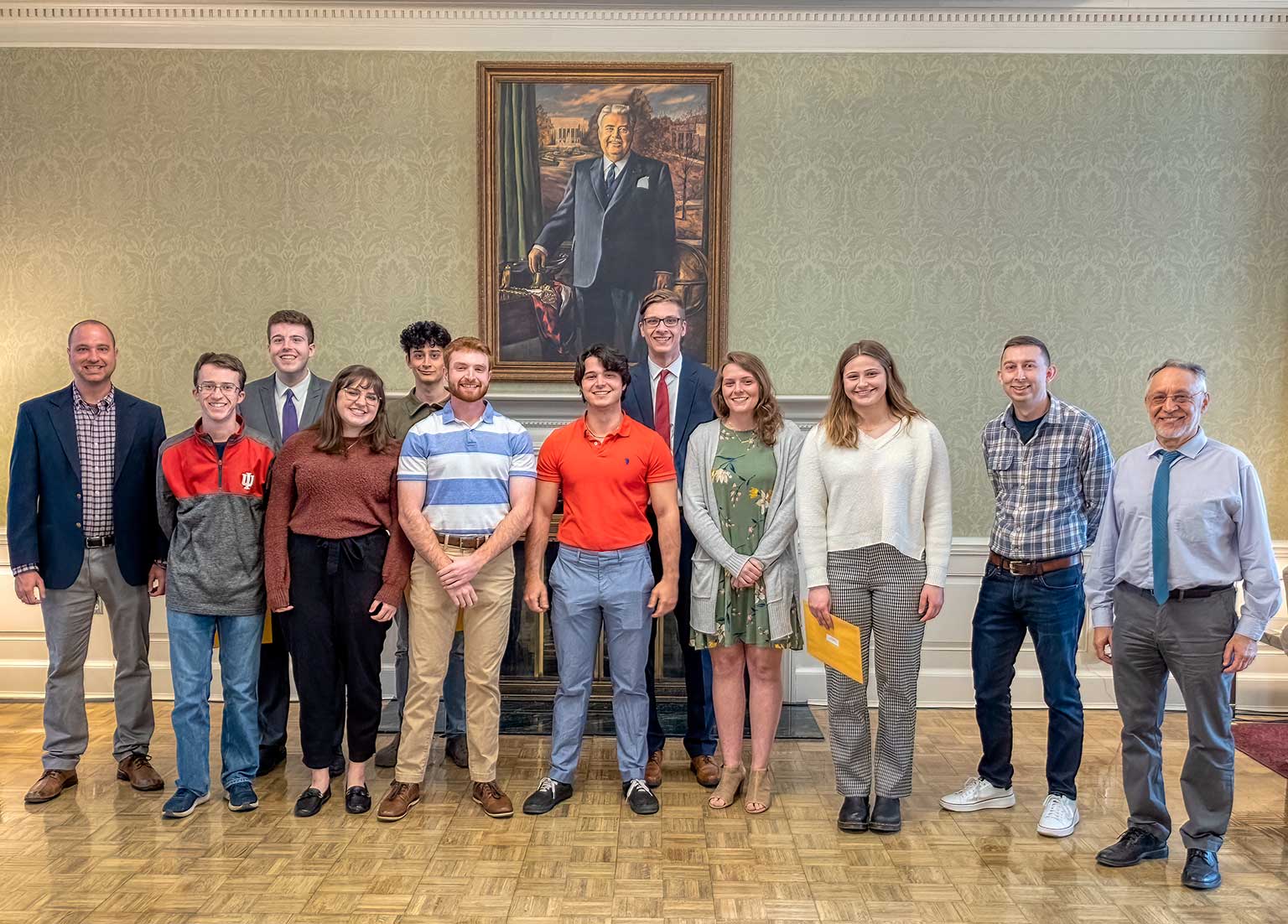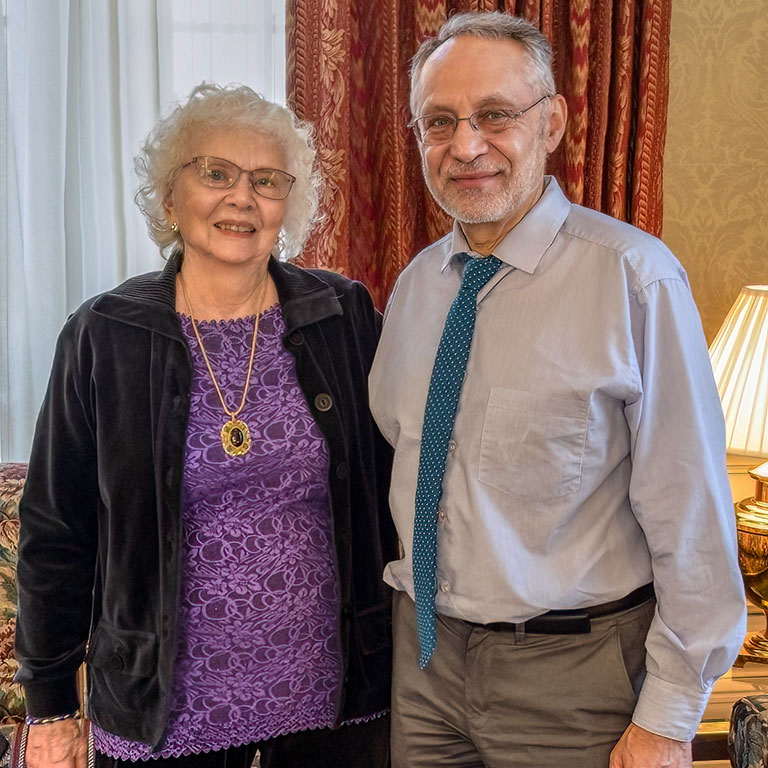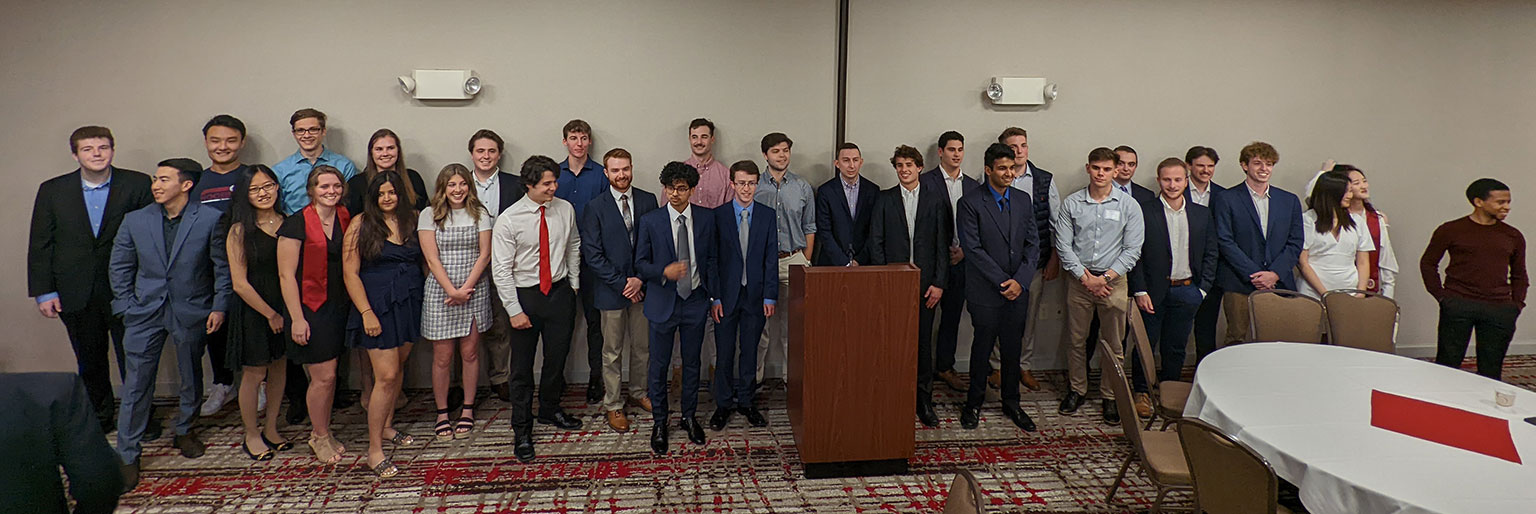We are proud to announce that one of our outstanding seniors, Emma Bodiker, is the 2022 recipient of the Stadelmann Scholarship. Emma graduated in May 2022 earning an Economics B.A., with Math and Spanish minors, with highest distinction. In addition, she completed the Hutton Honors College program and also earned a Luddy Area Certificate in Informatics, also in May 2022. We asked Emma to tell us what it meant to her to win this scholarship and what she is doing after graduation.
Undergraduate Student News
Reflections on the Stadelmann Scholarship
By Emma Bodiker
In the week leading up to graduation this past May, I had the incredible honor of being nominated to apply for the Stadelmann Scholarship. Each year, this scholarship is awarded to one senior in either the Kelley School of Business Department of Business Economics & Public Policy or the Department of Economics. We were each asked to reflect on how the study of economics has impacted us.

Reading the reflections of previous winners, I felt a bit intimidated by the task as I didn't have plans to pursue further economics education, research, or a career path that more closely aligned with my studies. However, as I began to think about the past four years, I found that my time in the Department has been just as invaluable to me as it is to anybody working directly in the field. This is evident in everything I do—from the way I rationalize decisions on a daily basis to the critical thought I put into media consumption to the problem-solving I now do at my full-time job. Each of these things and more can be traced to teachable moments in lectures, meetings with professors, or conversations with classmates where I developed these important skills.
I am now working at Epic Systems, a company who specializes in hospital database software, on the Business Intelligence application. Here, I am working with the tools that generate reports and predictive analyses to help hospitals make better decisions. Looking back, the opportunity to apply to the Stadelmann Scholarship not only gave me a deeper appreciation for the Department, its faculty, and my peers, but it helped me enter my career with a more profound understanding of how my education can be applied beyond the classroom.
A final thank-you to everyone in the Department for making my time at Indiana University so worthwhile.
Department Hosts Annual Awards Reception
We were delighted to host our annual awards reception the year in person on April 4, 2022. We welcomed three special guests: Jackie Hall, partner of deceased faculty member Lloyd Orr; Harriet Pfister, assistant to the chair and undergraduate advisor from 1970-1993; and Shane Sanders, an economics undergraduate alumnus. We asked Professor Sanders to reflect on his time spent at IU.

Back Home Again in Indiana
By Shane Sanders
IUB Economics Alumnus, 2002 (Phi Beta Kappa, Summa Cum Laude, Departmental Honors)
Professor of Sports Economics & Analytics
Falk College of Sport & Human Dynamics
Syracuse University
First Impressions
During the Spring 2022 semester, my wife, Bhavneet, and I undertook concurrent sabbaticals—the first of our academic careers. We detached our daughters from their elementary school in upstate New York and journeyed west from Syracuse University to Indiana University Bloomington, where I had been an undergraduate economics student twenty years hence. The trip represented different possibilities for each of us. For Bhavneet, it represented an opportunity to meet and possibly work with some of the strongest health economists in the country within disparate parts of campus: the Department of Economics, O’Neill SPEA, the School of Public Health, and Kelley School of Business. For my daughters, Simran and Nanki, the trip represented a chance to develop a new persona in school and to experience Indiana basketball first-hand.
For me, the trip was a pilgrimage of sorts. I first visited the IUB campus as a nine-year-old in August of 1989, when my parents dropped off my oldest sister to begin her freshman year there. Being from a rural setting in central Indiana, I had very little awareness of the world then and believed that Indiana was essentially one large cornfield broken prominently in the center by Indianapolis and intermittently elsewhere by the occasional farmhouse or small town. I had no idea that the State was capable of containing a place like IU Bloomington. While I knew about the IU and Purdue Men’s Basketball teams, I didn’t associate these teams with any particular place in Indiana. I suppose my understanding to that point was that the two groups of players simply materialized twice a year into some vaguely-located gym—the IU players from some mythical “good place” and the Purdue players from some mythical “bad place”—to put on a spectacle that yielded the impression of part basketball, part tribal warfare.
Coming from such a reality-deficient worldview, I was awestruck the first time I walked through the IUB campus. I remember standing in front of Showalter Fountain for the longest time in a state of wonderment, with the IU Auditorium in the background, the Fine Arts building stage right, and Lilly Library stage left all set within the forested beauty of the campus. Seeing all of this, I had the distinct feeling that I couldn’t be in Indiana. In the fountain scene, Venus wasn’t clothed in the Conservative Midwestern sense of the word, or at all. Moreover, the buildings surrounding Venus, while made of local Indiana limestone, presented me with perhaps the first architectural aura I had ever witnessed—one that I associated at the time with a place far away from Indiana.
While I would later learn that this same stone was made by Indiana and the geology thereof, it didn’t seem to be made for Indiana. It seemed more naturally suited for places like New York City, where the Empire State Building was constructed from 200,000 cubic feet of Bloomington limestone. The Museum of Modern Art, the Grand Central Terminal and Saint Patrick’s Cathedral are other notable examples of Hoosier limestone’s prominent use in New York City architecture. Southern Indiana limestone was similarly foundational in the architectural development of Washington D.C., where such landmarks as the Pentagon, the National Theater, the National Cathedral, and the National Archives used the stone. Given the stone’s trademark smooth texture and elegant shading, it forms the exterior walls of some of the most notable buildings in the U.S. But for the modernist sensibilities of visionary, mid-twentieth century IUB President Herman B Wells, the local limestone we see preserved across campus today would have been shipped East in kind.
Undergraduate Years
While I was not a particularly vocal undergraduate student in the IUB Department of Economics, my fly-on-the-wall experience was nothing short of transformative. Receiving daily lectures from world-class economists and contemplating those lectures while walking aimlessly through a campus of immense natural and architectural beauty provided me with both the content and inspiration to absorb a large body of economic knowledge. Whatever one studies at IU Bloomington, she must consciously or subconsciously associate it with beauty given the backdrop of her learning.
Fast Forward to Present Day
Upon reaching Bloomington to begin my research leave, I contemplated the adage and Thomas Wolfe novel title You Can’t Go Home Again. My general view is that this adage does not represent an absolute truth. Like the limestone below, there are singularly beautiful absolutes that define the State and its namesake University. In at least some respects, however, the adage is not only true but non-negotiable. As the unsteady wind slowly shapes a rock wall over time, the unsteady churn of people and priorities can gradually shape and reshape a place. Of course, change is neither innately good nor bad. Rather, it provides necessary but not sufficient conditions for both progress and regress.
In the present case, I found that the Department of Economics—shepherded by Michael Kaganovich, James Walker, and several other stalwart faculty—had maintained a high degree of cultural continuity, while clearly progressing on the margins. Chief in my view, the Department has maintained its position as a frontier place of economics education and research. At the same time, the Department has furthered a longstanding tradition of diversity—with respect to people and ideas—by recruiting frontier-level faculty and students from around the world. These faculty have enriched new crops of IU Bloomington students from Indiana and elsewhere by imparting their deep and varied sets of knowledge. The path of the Department is consistent with the ideal path of the University as set forth by seminal IU Bloomington President Herman B Wells some 70 years ago: bring the world to IU and IU to the world. Unlike many of his protectionist contemporaries, Wells believed that he could best serve Indiana by creating a world-class university. Further, he believed that a University could only be world-class if it were truly world-connected. Today, IUB and certainly the IUB Department of Economics reflect Wells’ vision of the public university.
President Wells came to IU Bloomington first as a student of economics and later as a professor of economics. This is perhaps not coincidental. Economics, after all, is a discipline about the world at large. There is no specific Economics of the Western Hemisphere or Economics of Equatorial Nations. Rather, there is one, universal economics that studies the promotion of objectives subject to constraints. Even if such aspects as the bundles of economic goods change, the underlying principles do not. The etymology of the term economy itself (eco = household, nomy = laws governing the) implies universality. In its essence, economics is an enlightened global conversation that continues to be brought to IUB Economics students by the Department’s world-class faculty.
During my return to IU Bloomington this past Spring, I was able to meet and talk with professors who were pivotal in shaping my future some twenty years ago. In 1998, Arlington Williams taught me the importance of experimentation in testing microeconomic theory. In 1999, Willard Witte first presented me with economic modeling approaches and the importance of rational expectations theory in rooting macroeconomics in microeconomic behavior. In 2001 and 2002, Robert Becker further textured my economic thinking by presenting the theory of games and its role in such areas as finance and political economy. He also provided students with a vivid history of the development of game theory, which hooked many of us onto the subject. Some students, such as myself, were irrevocably hooked.
Sadly, I could not meet the late Dr. Roy Gardner, who advised my undergraduate thesis project in 2001-02. Dr. Gardner was gifted in deriving and presenting interesting behavioral and political applications of game theory. It was through these applications that I first developed an interest in strategic issues related to public choice. Without his influence, I would certainly not have subsequently published strategic and game theoretic papers in journals such as Public Choice and Journal of Business & Economic Statistics, nor would I now be present on the Editorial Board of Public Choice.
In the Spring 2022 semester, I also enjoyed making new friends in the Department. I was able to have several interesting conversations with Dr. Walker. While Dr. Walker was Department Chair and a leading researcher during my undergraduate years, I was still in my fly-on-the-wall stage of life and could never quite muster the confidence to talk with him back then. I am grateful to have returned to IUB and to have gotten to know him during this reunion tour. In April of 2022, I gave a brief talk at the Departmental Awards Ceremony. Dr. Kaganovich hosted a memorable Ceremony that felt directly connected to the ceremonies of the early 2000s that I remember so well. In my own case, the recognition I received from the Department served as a much-needed source of confidence that sprung me into graduate school and, eventually, to a successful academic career in economics. In the modern-day version of the Ceremony, Dr. Kaganovich and his colleagues celebrated each achievement that took place in the Department that year, evoking substantial joy and excitement among the students and faculty in attendance. As in my student days, the Ceremony undoubtedly served as a substantial source of future inspiration for the Department’s current students.
At the Ceremony, I also met younger faculty members such as Volodymyr Lugovskyy. I found Volodymyr and others to be welcoming and dedicated, both to the craft of economics research and to the education of future economics students at IUB.
As I write the 1620th word of this essay, I am reminded that my original guidelines were to write a short essay of perhaps 400 words. Hopefully, the newsletter printing industry has not, like so many other industries over the past few years, experienced some obscure and unexplainable supply chain disruption that has rendered the printed page several times more costly than in 2019. If this is the case, the present article can be summarized as follows for cost purposes:
In some respects, the IUB Department of Economics has changed in the past twenty years. However, this change can be characterized as progressive in nature. The Department has only built on its role as a cutting-edge and inspiring place to learn and research economics for the students of Indiana and of the world.
Congratulations to our 2021-2022 Undergraduate Award Winners!
At our April 4, 2022 Department of Economics Annual Awards Reception, we were pleased to recognize our most outstanding undergraduate students. Michael Kaganovich, chair of the department, hosted the reception.


Elected to Phi Beta Kappa in Fall 2021
Emma Bodiker
Connor Henderson
Isaak Mount
Jonathan Ralstin
George Stylianou
Elected to Phi Beta Kappa in Spring 2022
Vijay Chirumamilla
Clayton Rossman
Elected to Phi Beta Kappa in Fall 2022
Macy Lyn Brammer
Jane Alyssa Hepp
Kris Kirilov Nikolchev
Leah Marie Roebuck
Sam Russum Shoemaker
Stadelmann Scholarship
Emma Bodiker
Carrington Scholarships for Outstanding Economics Students
Ben Hoham (Outstanding Sophomore in Economics)
Macy Brammer (Outstanding Junior in Economics)
Jonathan Ralstin (Outstanding Senior in Economics)
Robert A. Buccieri, Jr. Scholarship
Nash Devenport
Kemal Perdana
Abby DeArmitt
Robert N. Johnson Economics Encouragement Scholarship
Jakob Hebebrand
George Stylianou
Arlington W. Williams Scholarship
Jennifer Blitchok
Carroll Christenson Award
Jacob Herbert
James E. Moffat Scholarship Award for Outstanding Economics Majors
Makynsie Bancroft
Emma Bodiker
Connor Henderson
Isaak Mount
Mr. & Mrs. Harold E. Strow Award
(presented by Shane Sanders who received this award in 2002)
Eli Goldstein
Department Hosts Annual Graduation Reception
The Department was excited we could host our annual graduation reception in person on May 6, 2022. Families gathered with faculty and staff to honor economics majors who graduated in May or August 2022. Emma Bodiker, Eli Goldstein, and Jonathan Ralstin spoke about their undergraduate days as economics majors. Each graduate was recognized and photographed with Michael Kaganovich, Chair, and Jimmy Walker, Associate Chair.

 The College of Arts
The College of Arts